#king ludwig of bayern
Text
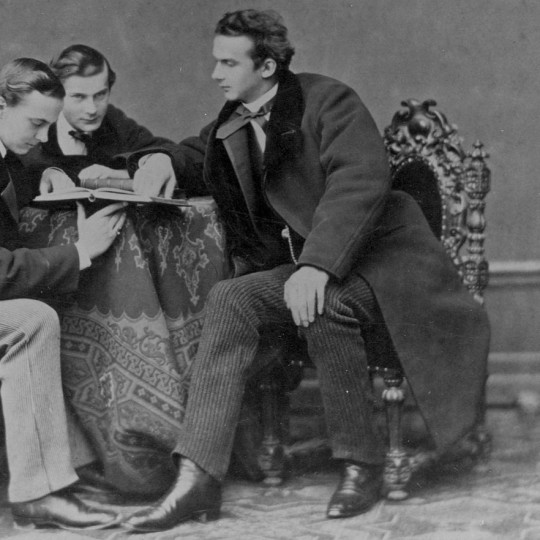
Guess Wass We Were Reading?
Jos. Albert, 1860s
#ludwig ii#daguerreotype#photography#king ludwig of bayern#kini#richard wagner#neuschwanstein#linderhof#ludwig wittelsbach#herrenchiemsee#wittelsbach#sissi#elizabeth of bavaria#mad king ludwig#maerchenkoenig#moon king#swan king
111 notes
·
View notes
Text
A Quite Stupid Story
One night King Ludwig was having a hard time falling in sleep, then he heard a voice singing. It was the most beautiful thing he had heard, as pure as a choirboy singing, but when he just planned to figure out whose voice it was in the morning, it disappeared. Several days later, he discovered a swan following him secretly and brought it to the pound beside the castle, it settled down in its new home. At night, the voice came back, and was stronger than before, King Ludwig thought it came from the pound and rushed to it. He saw no swan but a boy, singing an ancient chant from Medieval Age. God, he must be an elf, thought the king. Then he greeted the boy, whom was frightened by his arrival. King Ludwig asked who he was, the boy answered that he was a son of a knight and was cursed by a witch, so he remained human at night and turned into a swan during the daytime. The witch said only a noble man who trusted him unconditionally could save him, if the man didn't question him about his name for seven days the curse would be invalid. King Ludwig felt pity for the boy and was determined to save him. But, you know, like Elsa he failed the test, the boy died after answering the question.
#sorry herr vogt i mean no offense#swan tale#lohengrin adaptation#but his voice is so stunning#king ludwig of bayern
0 notes
Text


Konig von Bayern / Germany - LUDWIG ii + his castles. 2nd: Neuschwanstein castle.
#Neuschwanstein#castle#zamek#litho#Ludwig II#pocztówka#kartka#germany#litografia#post card#niemcy#Schloss#Konig#king#król#Bayern
16 notes
·
View notes
Text
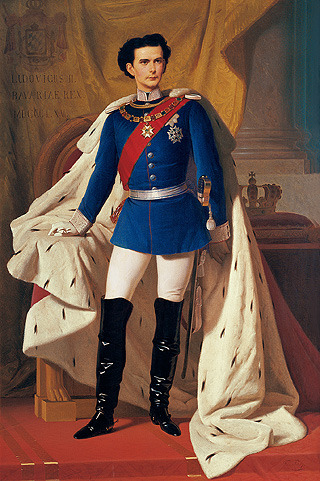
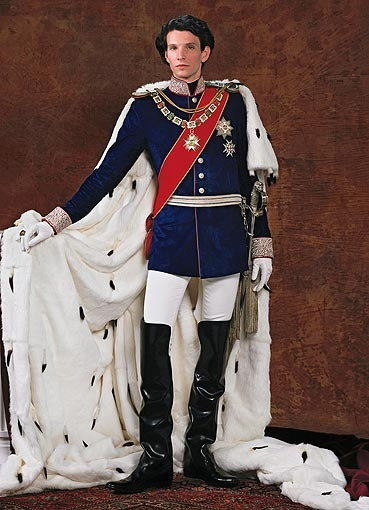
King Ludwig II in Bavarian general's uniform with coronation mantle,
painting by Ferdinand Piloty, 1865
vs
Ludwig's costume in movie Ludwig II (2012)
#ludwig ii#sabin tambrea#bavaria#germany#movie costumes#neuschwanstein castle#portrait#ludwig ii of bavaria#art#historical movies#when costume department slayed#where is this movie's oscar??#where is his oscar?#king ludwig ii#konig ludwig ii von bayern
10 notes
·
View notes
Text




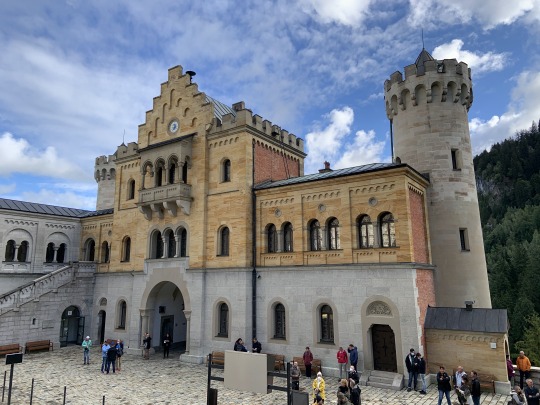





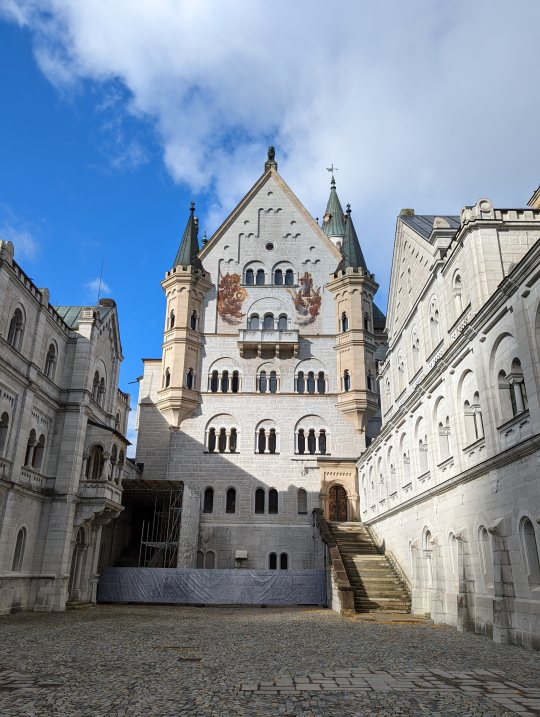
Neuschwanstein Castle, Germany
#original photography#Neuschwanstein#architecture#King Ludwig II of Bavaria#Bavaria#Bayern#Castle#Germany#mine
80 notes
·
View notes
Photo

King Ludwig II in generalfeldmarschalls' uniform and coronation robe. Ferdinand von Piloty.
#coronation robes#full length portrait#house of wittelsbach#king ludwig ii of bavaria#haus wittelsbach#bavaria#bayern#house of bavaria#full-length portrait
39 notes
·
View notes
Text
I am hyperfocused on fränkische Tracht and I will apply it onto everything possible. I would apply it on late 18th century fashion, if late 18th century didn't basically completely shape fränkische Tracht. Like fränkische Tracht isn't basically just late 18th century fashion with colors specific for the town or village or something. If you only look at the men's Tracht with linen breeches (and not the one's with leather, both are possible), it is pretty clear, especially with the tricorn.
I know this means nothing, if you don't know what late 18th century men's fashion looks like. But it's basically the only thing I've been thinking about for days now.
#in my 'gets overly invested in trachten' face#sorry everyone#it's either trachten or dead german or austrian monarch for some reason#also combined by king ludwig ii of bavaria#because while king ludwig i was really interested in the greek language (putting the y into bayern)#king ludwig ii (his grandson) was really interested in trachten#now why do i know this? because i looked it up once and it just burned itself into my brain#-franz
0 notes
Text
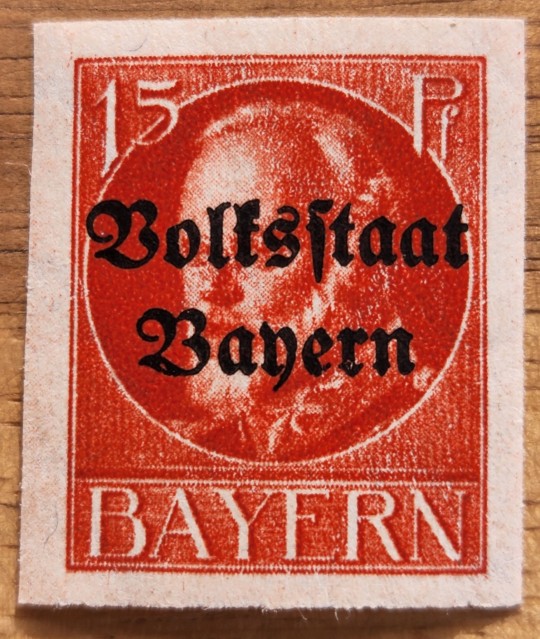
#postage stamp#stamps#royalty#king ludwig#Bavaria#people's republic of bavaria#bayern#Volksstaat Bayern#1919#1910s#1920s
0 notes
Text
Tristan and Isolde is a very known Story in Europe. Especially in Germany. Thanks to Richard Wagners Opera with the same name, it became so popular King Ludwig II. of Bayern commissioned a Tristan and Isolde Painting for his Neuschwanstein Castle! It's painted by August Spieß (1881) and in his bedroom!
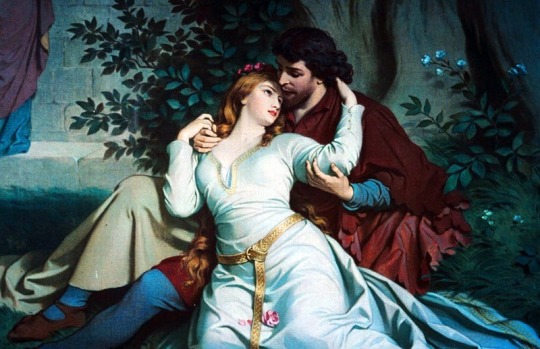
Here you can see the Painting in the Bedroom and how big it actually is. On the full Painting you can see Brangaine in the Background as well, what a sight to behold!
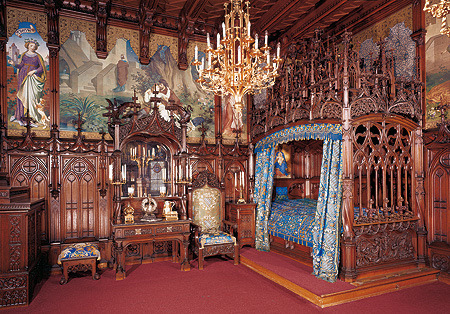

#fate grand order#fgo#fate go#tristan#fate go tristan#fate grand order tristan#fgo tristan#tristan fate go#tristan fate grand order#tristan fgo#richard wagner opera#richard wagner tristan und isolde#tristan and isolde#tristan and iseult#neuschwanstein castle#painting#Art#August Spieß#Wagner Opera#Tristan and Isolde Opera#Tristan Facts with Juquia
211 notes
·
View notes
Text
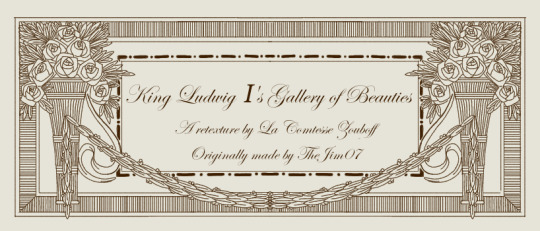
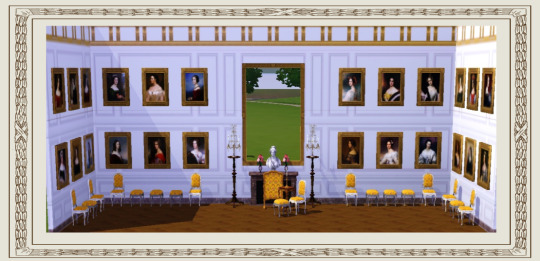
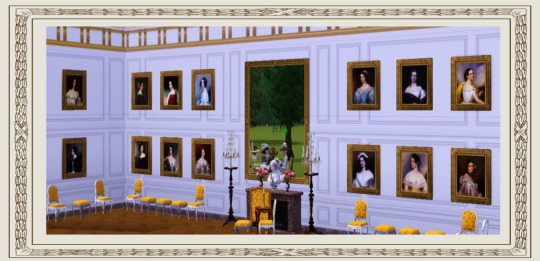
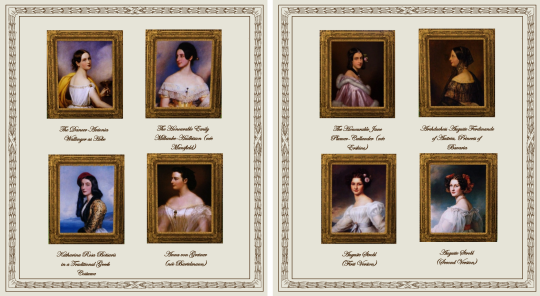


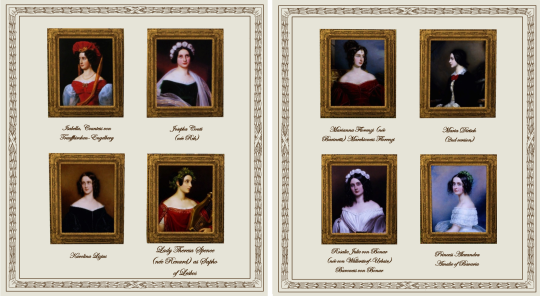
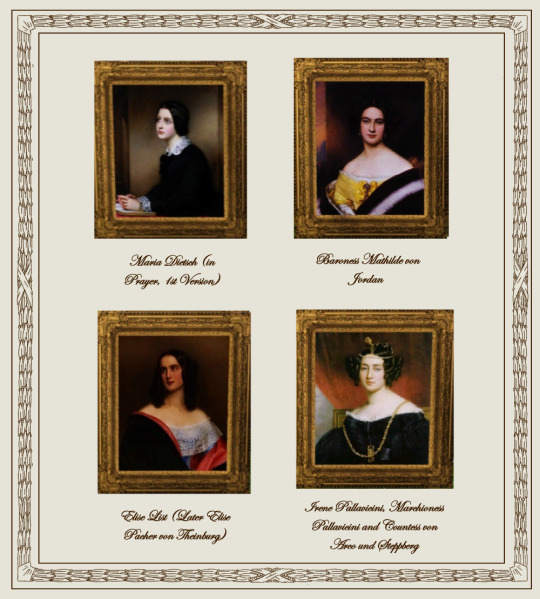

King Ludwig Ist's Gallery of Beauties.
A retexture by La Comtesse Zouboff — Original Mesh by @thejim07
The Gallery of Beauties (Schönheitengalerie) is a collection of 38 small portraits of the most beautiful women from the nobility and middle classes of Munich, Germany painted between 1827 and 1850 (mostly by Karl Joseph Stieler, appointed court painter in 1820) and gathered by Ludwig I of Bavaria in the south pavilion of Nymphenburg Palace in Munich. Two additional ones were created by Friedrick Drück and one portrait was stolen in the XXth century and remains missing.
The set includes all the 38 portraits, with the original frame swatches, fully recolorable. The portraits are of:
Friederike von Gumppenberg (later Baroness von Gumppenberg).
Amalia von Schintling.
Amalie Maximilianovna von Krüdener (née von Lerchenfeld) Baroness von Krüdener.
Anna Hillmayer.
Anna von Greiner (née Bartelmann)
Antonietta Cornelia Vetterlein.
Archduchess Auguste Ferdinande of Austria, Princess of Bavaria.
Auguste Strobl (first version).
Auguste Strobl (second version).
Baroness Mathilde von Jordan.
Carlotta von Boos zu Waldeck (née von Breidbach-Bürresheim) Baroness von Breidbach-Bürresheim.
Caroline Maximiliana Maria von Holnstein (née von Spiering) Countess von Holnstein aus Bayern
Elise List (later Elise Pacher von Theinburg
Eliza Rosanna James (née Gilbert), Known ss Lola Montez.
Helene Kreszenz Sedlmayr.
Irene Pallavicini, Marchioness Pallavicini and Countess von Arco un Steppberg.
Isabella, Countess von Traufkirchen-Engelberg.
Jane Elizabeth Digby, Later Baroness von Venningen.
Josepha Conti (née Reh).
Karolina Lizius.
Katharina Rosa Botsaris in a Traditional Greek Costume.
Lady Theresa Spence (née Renard) as Sapho of Lesbos.
Maria Dietsch (In prayer, first version).
Maria Dietsch (second version).
Marianna Florenzi (née Bacinetti) Marchioness Florenzi.
Marie Friederike Franziska Hedwig of Prussia, Crown Princess of Bavaria.
Maximiliane Borzaga.
Nanette von Kaulla.
Princess Alexandra Amalie of Bavaria.
Caroline von Oettingen-Wallerstein (later Countess von Waldbott-Bassenheim.
Regina Daxenberger.
Rosalie Julie von Bonar (née von Wüllerstorf-Urbair) Baroness von Bonar.
Sophie Friederike Dorothea Wilhemine, Archduchess of Austria (née Princess of Bavaria).
The Actress Charlotte von Hagn-Schwab as Thekla in Schiller's "Wallenstein".
The Actress Friederica Katharina "Willhemine" Sulzer.
The Dancer Antonia Wallinger as Hebe.
The Honourable Emily Mikbanke-Huskisson (née Mansfield)
The Honourable Jane Plumer-Callander (née Erskine)
Found under decor > paintings for 540§
Retextured from the "Portrait of Balsasarre Castiglione" found here
-------------------------------------------------------
CC shown here:
Wall paneling, mirror, girandole and floor by @thejim07
Fireplace by @hydrangeachainsaw
Chairs, stools, flower vases, bust, table, fireplace screen and candelabra by @joojconverts
Torchere by @martassimsbookcc
(Btw excuse my sims' reflection having tea)

Drive
(Sims3Pack | Package)
(Useful tags below)
@joojconverts @ts3history @ts3historicalccfinds @deniisu-sims @katsujiiccfinds
-------------------------------------------------------
#the sims 3#ts3#sims 3 cc#portrait#s3cc#sims 3#sims 3 download#sims 3 decor#joseph karl stieler#Munich#germany#nymphenburg#wall decor
85 notes
·
View notes
Note
Hi, I loved your answer regarding napoleon's relationship with his stepson, Eugene. I wanted to ask did their relationship detoriate after the birth of napoleon's son, did he try to remove Eugene to make way for his son? Wasn't it rude and passive aggressive towards Eugene to give his infant son the tittle "King of Rome" while Eugene was already the viceroy of Italy for a very long time, thus highlighting his own son will always be superior.
I would like to hear your personal opinions too
Hello and thank you for the question! I wish I had more a bit more time and knowledge to answer in full because this seems like a very interesting topic to me.
But I fear this will only be an accumulation of bits and bops, mostly unrelated. Let’s start with the first part
I wanted to ask did their relationship detoriate after the birth of napoleon's son, did he try to remove Eugène to make way for his son?
Well, it depends a lot on who you ask. Let’s first hand the mic to the missus:
Auguste von Bayern to her brother Ludwig, 29 March 1811 (while Eugène had left for Paris in order to assist at the baptism of the little Roi de Rome):
[…] Eugène cannot leave Paris before the King of Rome is christened and I must consider myself lucky if I see him again in the first days of March. One more son and Italy will be lost to us. We already have three children ... but why grieve in advance? God is doing everything for the best, he will continue to take care of us. With all my resolutions I am sometimes on the point of seriously upsetting myself! Our fate is not decided and this uncertainty is terrible. It would be better for our cause to live away from it all, because becoming less than we are now is hard. […]
As usual, we have very little insight into Eugène’s own emotions. But I guess this snippet shows how very torn at least Auguste was, how she feared for Eugène’s and her own future and how insulted she felt by what she clearly saw as a degradation her husband had suffered – not so much by the title King of Rome for Napoleon’s new-born baby son, but by the mere existence of that baby and the possibility of him having brothers.
On the other hand, Cambacérès in his memoirs claims (in a brief sentence) that Josephine had agreed to the anullement of her marriage mostly on behalf of her children (which is why her biographer Pierre Branda suspects that Hortense and Eugène may have sold their mother out in order to keep their high positions at court. I do not necessarily agree with this).
Fact is: Before Josephine’s repudiation, Eugène had been the heir presumptive of the Kingdom of Italy. Napoleon’s original plan seems to have been to completely strip Eugène of any right to inherit at once, as he immediately started looking for a way to compensate him for it right after Josephine had moved out (there was a plan for a principality of Raab for some time, but in the end – February 1810 - it was agreed that Eugène should inherit an enlarged great-duchy of Frankfurt, belonging to Dalberg at the time).
Also according to Cambacérès, Auguste, during her stay in Paris for Napoleon’s second marriage, had a long interview with Napoleon – in which she most likely did not hold back in telling His Imperial Majesty how she felt about this matter. After all, she had agreed to marry this lowly specimen of an unsuitable husband (whom she by now could not do without for any prolonged period of time) merely on the premise he would be declared a king one day! Besides, it was an odd way to reward a faithful subject who had not only been working his ass of for Napoleon’s sake in Italy but also had contributed quite a bit to the latest victory over Austria, wasn't it?
It may have been during this interview when Napoleon agreed to the arrangement Auguste described in the letter to her brother. Eugène would retain his position as heir to the crown of Italy for now, as the little King of Rome would only inherit the crown of France and of the Empire. A second son of Napoleon, however, would then receive the Kingdom of Italy, and in this case, Eugène’s family would loose out on everything that had been promised to them once, and would be reduced to the Grand-Duchy of Frankfurt.
As to my personal opinion: I do not think it really mattered much. I believe that Napoleon was telling the truth when (either towards Roederer or to Miot de Mélito) he said that he was not stupid enough to give Italy to Eugène – and that happened either before or shortly after the coronation! He never had planned on giving Eugène anything, or if he had, he had changed opinion a long time before 1809, at the very least when Eugène’s first two children had only been daughters. There are some hints that make me believe that, but that’s a different story alltogether.
Moving on to the second part of the question:
Wasn't it rude and passive aggressive towards Eugene to give his infant son the title "King of Rome" while Eugene was already the viceroy of Italy for a very long time, thus highlighting his own son will always be superior?
In this, I would actually like to defend Napoleon for once: I do not think this was a move directed at Eugène, but at the whole of Europe. Rex Romanorum, King of the Romans, had been a title the emperors of the HRE gave to their designated heirs, and Napoleon seemingly wanted to continue that tradition and in doing so strengthen his claim as their rightful successor in being the highest-ranking monarch of (western) Europe.
In particular, this choice did not concern Eugène because Rome had never been part of the territory Eugène governed. Napoleon’s Kingdom of Italy in the beginning centered on Lombardy and over time stretched out in almost all directions. But when the Pope was arrested and brought to France, the former Papal States were annexed not to the Kingdom of Italy but to France (which in itself is already pretty telling as it seems by this time Napoleon was already planning a large territorial state under his direct rule that would encompass much more than only France). So by the time Napoleon II was born, Rome and its surroundings were a French départment, the inhabitants had French nationality. If anything, it was the Pope who, on hearing the title King of Rome, would have been told that he would never receive his territory back.
As to the new-born son – or any legitimate biological son of Napoleon - being superior to Eugène: I do not think this was ever in question. It had been made very clear already at the time of Eugène’s adoption in 1806, and Eugène was very aware of it.
I hope this long rambling did make a bit of sense – I’m sorry if not, I’ve been on the road yesterday and I’m still quite tired even today, so I apologize if I’m even less comprehensive than usual. Thank you so much for the Ask and for giving some love to the boy!
17 notes
·
View notes
Text
youtube
dailymotion
#ludwig ii#movies#ludwig wittelsbach#bayern#king ludwig of bavaria#visconti#sabin tambrea#helmut berger#1955#1973#2012#ludwig: requiem for a virgin king#sisi#elizabeth of austria#Youtube
48 notes
·
View notes
Text
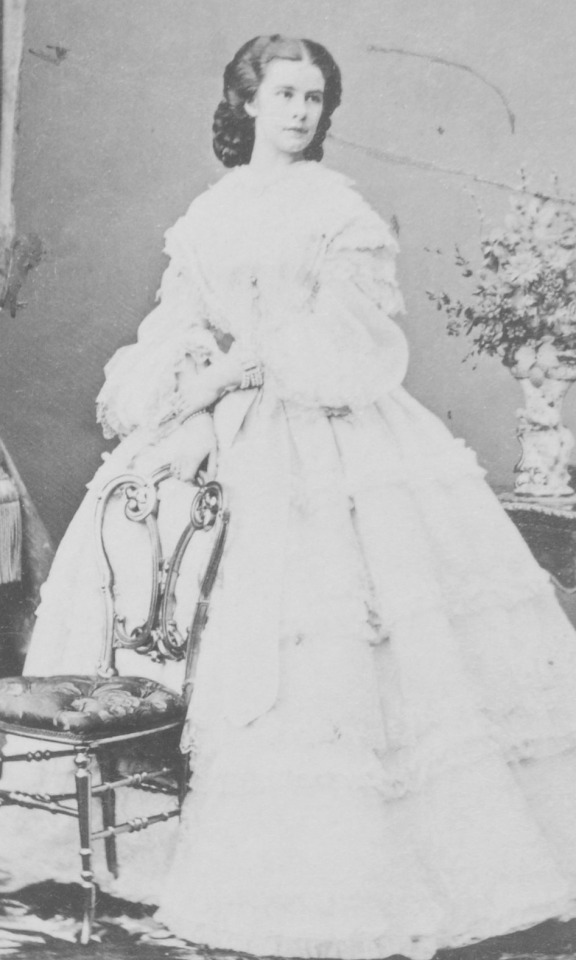
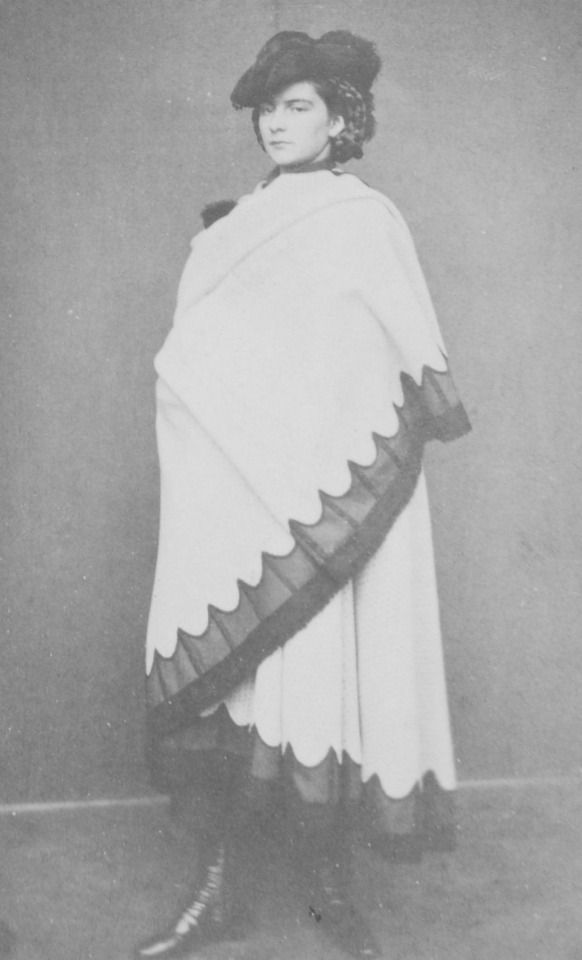
By the beginning of 1860 the young Empress was living in a state of incessant agitation. Three confinements in the space of four years, the vicissitudes of the war, and her constant feud with the Archduchess [Sophie] and her clique had undermined her health. And now another thing happened which she felt most acutely, for she had a very strong family feeling. The idea of a united Italy had taken great strides since the campaign of 1859, and her brother-in-law’s position suffered in proportion. The King and Queen of Naples knew not a moment’s peace. Sporadic risings broke out, and in May Garibaldi started out on his famous expedition of the Thousand, which at a single blow severed Sicily from the Kingdom of Naples, and, when Palermo fell on June 6, 1860, showed the whole world that the Bourbon regime had feet of clay. Appeal after appeal for help went forth from Naples to the courts of Europe, and naturally to Vienna among them. Elizabeth implored her husband to intervene, but since his unsuccessful campaign the situation was such that no assistance could possibly be given. On June 13 Dukes Ludwig and Karl in Bayern arrived secretly at Laxenburg on a visit to the Empress, and discussed every possible and impossible plan for helping their sister, but all in vain. The Dukes were able to observe the state of Elizabeth’s nerves and general health, and to see what a pitch the antipathy between her and her mother-in-law had reached.
It was a long time since she had spent much time with her dear ones in Bavaria, and she now promised to pay them a visit in July. At Possenhofen, too, everybody was very much upset about the fate of the Queen of Naples. They heard that the King reigned but did not govern and was quite unfit to cope with the emergency. Garibaldi was already thinking of crossing over to the mainland from Sicily. The Austrian minister reported that the King of Naples had hardly anybody left upon whom he could really depend. Yet the Queen was in favor of his defending his crown by arms at all costs. Then, on August 21, Garibaldi landed in the south of the peninsula, and everywhere both army and people went over to him. King Francis looked on apathetically, but his twenty- year-old queen [sic Queen Marie was actually only 18-years-old] was admirable in her energy and courage. She was said to have told her husband that if he did not place himself at the head of the troops which still remained loyal, she would do so herself.
Meanwhile the magic name of Garibaldi was doing its work, and all that remained to the King was to retire into the fortress of Gaeta. For his own part, he would have preferred to throw up the whole thing. He only put up a defense in order to secure a successful retreat, and because he was shamed by the demeanor of his wife, whose courage rose as the danger increased, a characteristic in which she resembled her sister the Empress. Elizabeth felt the deepest sympathy with her sister’s fate, and the consciousness that she herself had to sit by with hands folded increased her nervous irritability.
Corti, Egon Caesar Conte (1936). Elizabeth, Empress of Austria (translation by Catherine Alison Phillips)
#empress elisabeth of austria#queen marie sophie of the two sicilies#francesco ii of the two sicilies#duke ludwig wilhelm in bavaria#karl theodor duke in bavaria#historian: egon caesar conte corti#historicwomendaily
78 notes
·
View notes
Text

BAMBERG / GERMANY - King Ludwig II of Bavaria.
#Bamberg#Bayern#Bawaria#litografia#Bavaria#Ludwig II#king#pocztówka#post card#kartka#gruss aus#germany#niemcy#litho#Konig#król
4 notes
·
View notes
Text
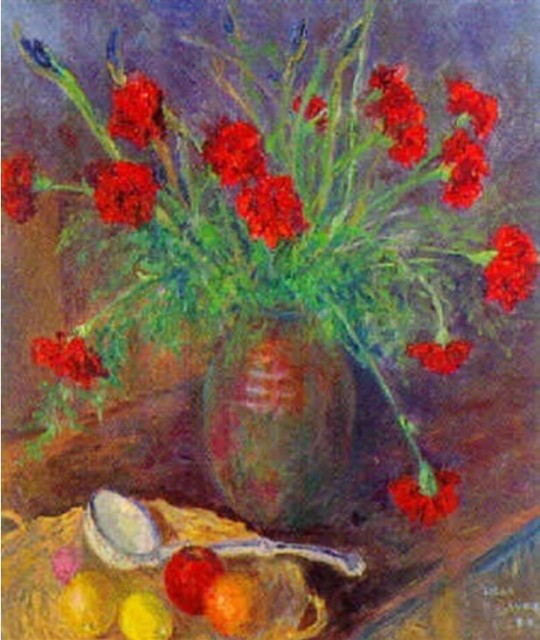
Rote Nelken in der Vase , 1980
Maria del Pilar von Bayern (1891-1987, German)
Princess Pilar of Bavaria (Maria del Pilar Eulalia Antonia Isabella Ludovika Franziska Josepha Rita Euphrasia von Wittelsbach, princess of Bavaria) was the only daughter of Prince Ludwig Ferdinand of Bavaria and his wife Infanta Maria de la Paz of Spain.
Princess Pilar was the co-author of a 1932 biography, Every Inch a King, about her cousin King Alfonso XIII of Spain. Princess Pilar was also an artist and headed the Bavarian branch of the German Red Cross for 40 years.
Other painter's works: https://www.artnet.com/artists/maria-del-pilar-von-bayern/
#dianthus#carnation#fruits#painting#still life#flowers#flower vase#women in art#woman painter#german art#Maria del Pilar von Bayern#20th century painting#20th century art
4 notes
·
View notes
Text
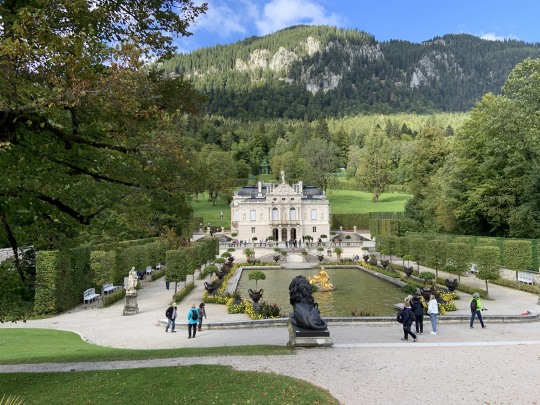

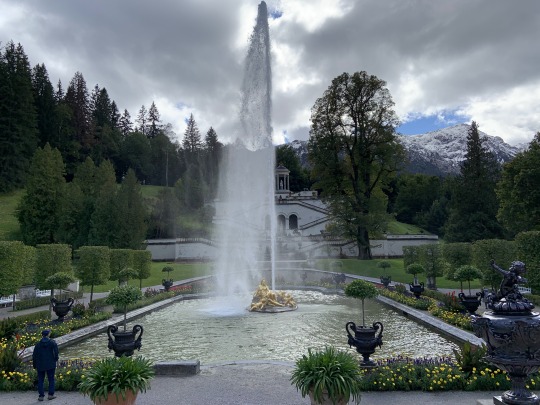
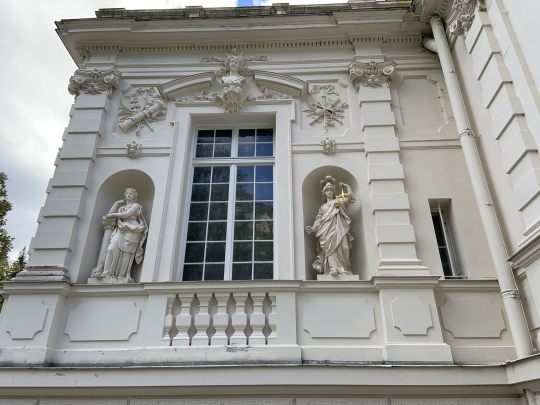
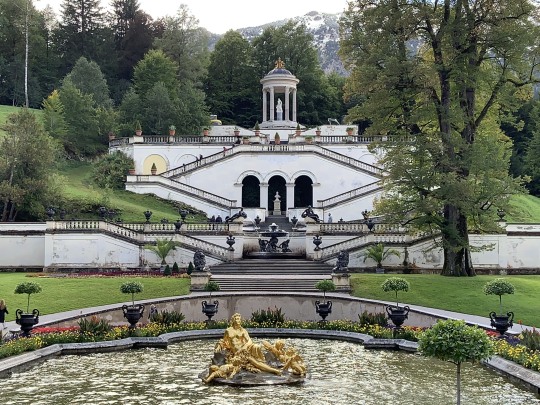

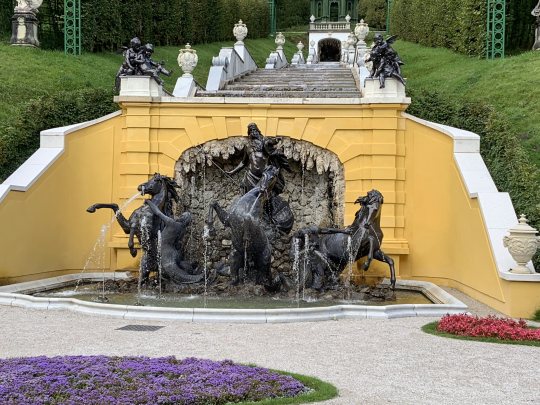
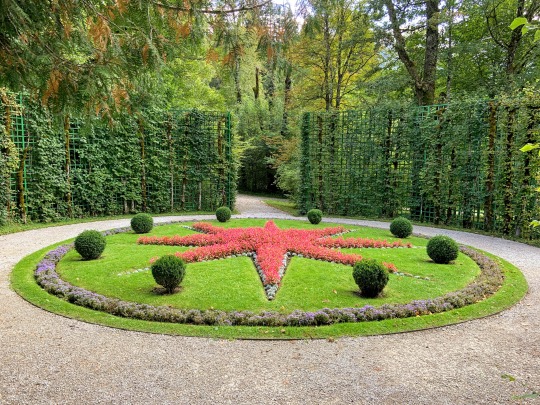
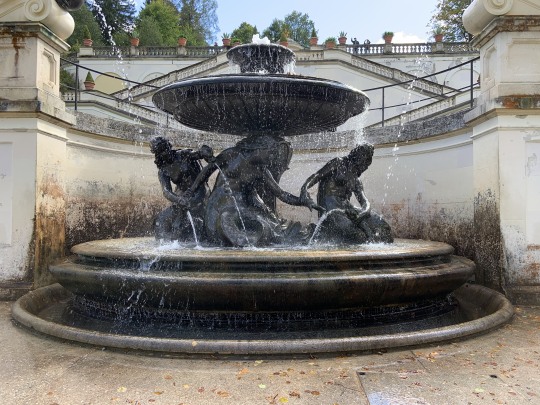
Linderhof Palace, Germany
#original photography#Linderhof palace#Germany#King Ludwig II#Bavaria#architecture#rococo#Bayern#mine
62 notes
·
View notes